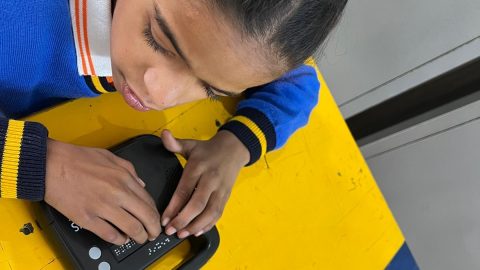Microsoft Enables Vendors to Hire Workers with Disabilities
The following blog post was written by Jake Siegel, a writer for MSW, Microsoft’s employee web portal.
—-
Danielle Serkin-Poole was just a young girl when she fell in love with cooking. Officially, her parents told her the kitchen was off-limits. But at around age six, she started to follow her dad and watch him make dinner. Over the years, she learned how to cook everything from perfect French toast (the secret is using challah for the bread) to potato latkes.
 |
Serkin-Poole recounted her early cooking adventures after a recent shift at the building 43 café. She works five days a week at the newly remodeled café filling up napkin containers and salt and pepper shakers and shuttling trays and dishes from the cafeteria to the kitchen. |
But soon she will transition to a new role, one that reconnects her to her early passion: food prep. In a few weeks, she will be in the kitchen helping keep the salad bar stocked with fresh veggies. “It’s my dream job,” she said.
Serkin-Poole, who recently celebrated three years of working for Compass Group on the Microsoft campus, has a developmental disability. She started working on the Redmond campus as part of Microsoft’s supported employment program, which encourages its vendors to hire people with developmental disabilities. Puget Sound Personnel, Serkin-Poole’s supported employment vendor, partnered with Compass Group to customize the position to best fit Serkin-Poole’s strengths.
The program isn’t new; Microsoft has encouraged its vendors to bring supported employees to campus for nearly 30 years. But the company has decided to expand the program and wants to have 200 supported employees working on campus within the next three years.
“We believe that work is an important part of everyone’s life,” said Rob Towne, senior services manager for Real Estate and Facilities (RE&F). “The developmental disabled community in King County is underserved. As a company we can help that underserved community find jobs.”
Lisa Brummel, executive vice president of Human Resources, called the program an integral part of the company’s diversity and inclusion efforts. “The challenges and reality of diverse hiring makes us a stronger workplace and community,” she said. “It builds our understanding of, and compassion for, the needs and challenges confronted by others and demonstrates that we all have the right to engage in meaningful work opportunities, regardless of our differences.”
The expansion is being spearheaded by RE&F, which will help its vendor partners remove roadblocks to bring in more supported employees to staff the Redmond campus cafeterias, mail rooms, and reception desks, said Chris Owens, general manager of RE&F.
“Reviewing vendors’ operations and jobs, with an eye toward physical and mental requirements, is a beginning step to identifying jobs, or parts of jobs, that will work well for applicants who have a disability. The process is a deliberate one and requires a sustained commitment to appropriate accommodations that maximize the employee’s development, self-worth, and contribution to the company.”
All supported employees have a job coach, though their level of involvement varies. Erica Gilson, an employment specialist with Puget Sound Personnel and one of Serkin-Poole’s job coaches, said the program encourages a natural support system of coworkers. “What makes the program so successful is the support from everyone here,” she said at the building 43 café. “[The job coaches] don’t need to be here all the time. The supported employees want a sense of independence.”
Serkin-Poole, who has worked ever since she was in high school, is proud of her independence. She lives in an apartment on the east side (with a tabby cat named Samantha) and commutes every day to Redmond for work. Michael Brooks, the manager of the building 43 café, said that Serkin-Poole is a fantastic employee: hard-working, committed, and motivated. “Danielle’s not just part of our team, she’s part of our kitchen,” he said.
He said that he was proud of his team, which has indeed become a natural support system for Serkin-Poole. But it’s also a two-way street. “Danielle has a great eye for food service,” he said. “She sees things we didn’t catch, and she has zero problems bringing it to my attention.”
She also helps support her colleagues. In the midst of a recent lunch rush, Holly, also a supported employee in the café, didn’t know where to put items for recycling. Serkin-Poole quickly showed her.
During café 43’s remodeling, Serkin-Poole went to work in café 41. They were reluctant to let her go. The manager at café 41 asked Brooks if they could keep her. His one-word reply: Nope.
Serkin-Poole is eager for the fast pace of food prep. She expects to stock the salad bar every 10 minutes or so, which is fortunate—one of the favorite parts of her job is interacting with the café’s customers.
Feel free to say hello to Serkin-Poole or any supported employee on campus, Gilson said. But there’s no need to treat them any differently, she added.
“Just treat them like any other colleague. That’s what they want.”







